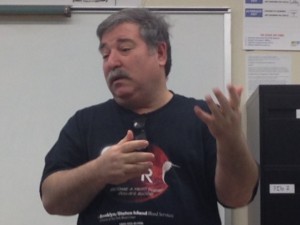It was sixth period in Jeff Kaufman’s Street Law class in Aspirations Diploma Plus High School in Brooklyn. Homicide was the subject of the day at the East New York transfer school that serves as a last chance for its 219 teens who have struggled in their previous schools.
Definitions on the white board included:
killing with intent
super reckless
felony murder

On February 10, a dozen students, half the total enrolled, showed up to one of the high school’s few electives offered that trimester. The 17-year veteran teacher considered it a good day. Half a class was better than less than half – the usual attendance rate in his other U.S. and World History classes. It was better than attendance in the rest of the school, which hovered around 43 percent that particular day.
“Do you still call it school when there are no students? That’s the philosophical question,” Kaufman wondered out loud, as he prepared to teach his class.
Undaunted, Kaufman walked around his class with confidence as his students called up the assignment on their desktop computers: What is the difference between being convicted of grand larceny or attempted grand larceny?
Kaufman knows the difference all too well from his time as a criminal defense attorney and as an NYPD officer in the 83rd and 73rd Precincts of East New York, neighborhoods with some of the highest homicide rates in the borough and city.
At one point, Kaufman asked the class what the legal definition of “jostling” might be. From the back of the class, Nassor Jordan, 18, offered an accurate definition. A dark-haired girl sitting across from him questioned in a snappy tone why he seemed to know so much about crime.
“He’s got some experience. Give him some credit,” Kaufman said, without missing a beat. The girl was silent. The lesson continued.
Kaufman has seen it all, from his years in law enforcement, criminal justice, and then as a high school teacher in Riker’s Island, all of which taught him a valuable lesson: strong relationships are the key to success, especially with the youth raised in one of the city’s highest rate of poverty and crime.
“Academics are important but it really takes second place to relationships,” said Kaufman, with conviction. He has years of teaching experience, particularly at failing schools where he sees at-risk youth struggle everyday.

Kaufman taught in what was once called East Brooklyn Congregation high school for two years, before it was phased out for chronic failure and eventually replaced in 2011 by Aspirations. He was the only teacher to make the switch from one school to the next. The others were displaced.
Since the beginning, Aspirations has struggled to keep its rates above the adequate mark. Attendance continues to hover around 63 percent. In 2012, zero students graduated after four years; 27 percent graduated after six years. Last year rates improved slightly, bringing the whole school up from a D to a C on the city’s report cards.
Keeping attendance up is one of the biggest challenges for teachers like Kaufman, who tries to hold students’ attention against life’s distractions. The relationships he has built with students motivate him.
Kaufman has made a career of getting inside kids’ heads, particularly those who may be stuck in some of the city’s most neglected neighborhoods and schools. Slightly more than half the residents in East New York qualify for welfare; and 11 percent — the highest rate in the city — have been accused of educational neglect.
Street Law, Kaufman knew from experience, was the best way to engage kids in learning about government and global history. The school has a 23 percent pass rate on the Regents Global History test, the lowest of any subject. “Criminal law is government to them,” said Kaufman. He argued to keep all his sections in the curriculum. But the principal decided to cut his other sixth and seventh period Street Law classes to make room for three-month test preparation courses.
This sixth period class is the last one offered. Kaufman asked a student to read the scenario of Rajana, a woman who committed arson. When she read the name “Rajana,” another student blurted out, “Vagina!” Kaufman ignored it. He barely registers retorts, jokes, and vulgar comments. Nothing much seems to rattle him. It’s part of his survival strategy.
Instead, he deflected the sophomoric retort with another question, “Can conspiracy happen between two people?” Silence. Random guesses followed, which he used to direct them to look it up online on Black’s Law Dictionary.
Jordan waited until the right moment, then volunteered detailed information about arson law. “You must have been charged with every crime in the penal law,” Kaufman said to Jordan.
“No, only a little,” Jordan responded matter-of-factly.
In the mid-90’s, Kaufman left life as a criminal defense lawyer to teach a paralegal program at Franklin K. Lane High School, a now shuttered Brooklyn public school, because he “saw something at the end of the tunnel” in the world of teaching adolescents. His time as a cop and as a lawyer left him unsatisfied. Kaufman wanted to make an “immediate impact” and yearned for a “sense of salvation” that came with teaching that he didn’t see on the streets.
When Franklin Lane shut down, Kaufman got a job teaching adolescent offenders at Rikers Island from 1998 to 2005. There he developed a course called Criminal law for the Incarcerated Student, an early version of Street Law. He encouraged students to get involved in activities such as a student newspaper at Rikers, Three Main Jump Off, and a citywide high school competition in stock market investment, which his students won.
Kaufman was forced to leave Rikers when he violated rules by contacting an inmate while Kaufman was outside of class and the jail to offer him extra help with college credit courses. He was sent to a reassignment center, more infamously known as New York City’s “Rubber Room,” where suspended teachers await their employment fate. Kaufman’s fate took him through Queens Academy, an early model transfer school in South Jamaica. A few months later Kaufman was moved to a suspension school in the Bronx, a part of Kips Bay Academy that took in students who violated a school’s disciplinary code. Finally in 2007, Kaufman was hired at the East New York high school. “I am now fully invested in education, so I’m not going to abandon it,” he said.
Kaufman is currently the union chapter chair at Aspirations as he was at Rikers. He served as one of the six high school representatives on the United Federation of Teachers executive board in 2003 and was a Patrolmen’s Benevolent Association delegate in the 83rd precinct. A member of a left-wing union cause, MORE, Movement of Rank and File Educators, he rallies for better working conditions for teachers.
Kaufman tried to implement a law club, debate team and peer mediation and youth court in the past at Aspirations but all were eliminated due to lack of interest and funding. While Kaufman believes “the model of transfer schools is awful,” in that it leaves at-risk youth without much needed support, he recognizes the students in them need someone who understands where they come from. “There is a certain way you’ve got to talk to these kids.”
“At first, I didn’t want this class,” said Onyjie Edwards, 19, of the Street law class. Edwards is currently on her school leadership team, a collaboration between school administration, parents and students where school concerns are heard. Edwards ended up finding the class very useful because she learned her rights. “I wish we had more classes like this in what we need to know on a regular basis.” Edwards is a senior who is one global history Regents exam away from graduating.
“I love this class; you learn about the law. People don’t know the law,” said student Abraham Aquino, 19, who hopes to enlist in the U.S. Navy after graduation. He liked how the class asked him to think about challenging concepts such as the relative difference between murder and rape, or how crime affects the criminals’ families, or other laws surrounding assault and misdemeanors.
“To me, it’s empowering. I want them to question authority, to question me, to question their parents,” Kaufman said of the class. He erased the white board moments before the bell rings for dismissal for the day.
The last trimester of the year will begin in a few weeks. This course would be eliminated to make room for Regents test prep. Kaufman ticked off other initiatives he began and lost. Street Law was just another. “These kids,” he said, “need special things.”
###



